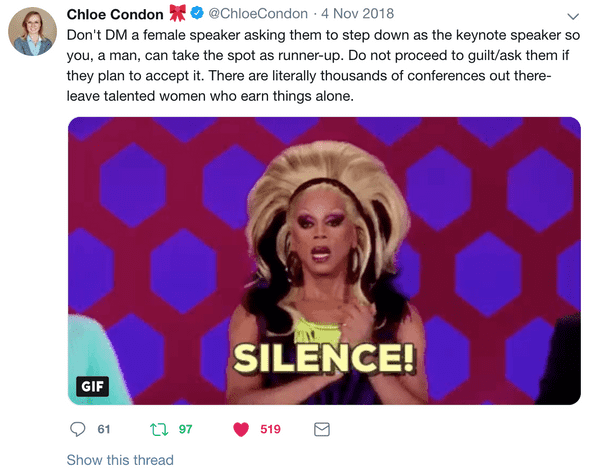Conference Speaking Like a Boss
Want to get started speaking at conferences, or step up your current game? Find out how conference talk acceptances work, the basics of writing a good talk abstract, and how to distinguish yourself from the crowd of submissions!
March 18, 2019
After an aggressive few years of conference speaking and recently starting to mentor other women on how to get in on the tech conference speaker circuit, I wanted to write down some thoughts about how to enter and navigate this world successfully.
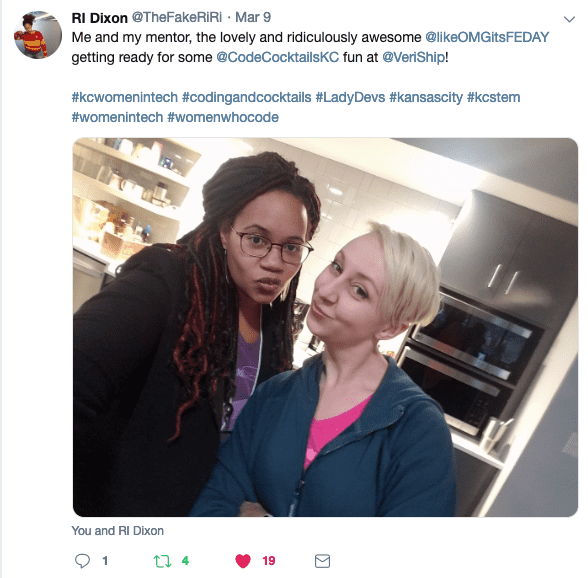
I feel like people look at how many conferences I speak at across the world and assume that A) I’m really lucky and B) There’s no way they could ever do that.
The truth is all it takes is hard work, perseverance, an understanding of the system, and humility - much like anything else in life. ;)
First, let’s get a few vocab words explained and out of the way:
- CFP - Call for papers/call for proposals. A way that conferences gather talk submissions to evaluate. Pay attention to the due dates (& time zones) on these.
-
Abstract - A title + summary of your talk that describes the topic, why it’s important, and what the audience will learn. Abstracts should be 300-500 characters. This is what the conference organizers will use to accept speakers, and most often what they will put in the program, so your abstract should be a pitch of your talk for conference attendees as much as the organizers.
A witty title tends to go a long way, but beware of titles like “XXX for fun and for profit”, “A primer on XXX”, “A lap around XXX”, “How I learned to stop hating XXX embrace XYZ”, and others that have started to become overused. The best talk title I’ve EVER seen is “Coding Naked – Unit testing those hard to reach places” - given by Caleb Jenkins at Codemash 2018. He told me his wife actually helped him come up with it.
- Track - A group of sessions running one after the other. May have a common theme or focus. i.e. “JavaScript”, or “Agile”, or “DevOps”
- Lightning Talk - a short (5-10 talk), often done in succession with other talks.
- Workshop/Precompiler - An in-depth coding workshop, ranging from 1-8 hours. Conferences often run workshops, or “precompilers” before the official conference days for a separate ticket cost. Some conferences will pay speakers for running workshops. Speakers may receive a set fee or percentage amount based on the number of attendees in their workshop.
These terms should cover most conference lingo you’ll hear, okurrr?

1. Understand How Conference Talk Acceptance Works
Every year conferences get hammered by more submissions than the previous year. A vast majority of conferences are run by volunteers or have selection committees of volunteers who are taking time away from their lives and families and side projects to review your talk submissions. Be considerate of the work they’re putting in. = )
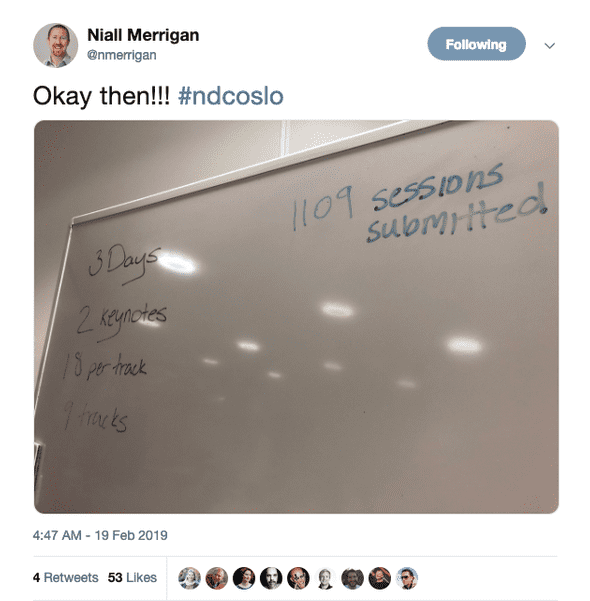
There are a few main types of conferences - single-track conferences, those that focus on a single technology or framework, and tech-agnostic conferences. Understanding these different types and what they look for will help you submit better abstracts that will appeal to attendees. Many conferences have started to list specifications with their CFPs to share the content their attendees are interested and the content they’re looking for to help guide your submissions, so take the time to look through what the conference organizers have to say instead of shotgunning your abstracts everywhere!
Conference Types
Single Track Conferences
These will be the hardest conferences to get accepted to as there are a limited number of spots. Conference organizers will be interested in very unique and different perspectives on talks, talks from thought-leaders or contributors to tools and frameworks, or talks generally relatable to development like performance optimization, testing, accessibility, security, etc.
Examples:
Single-Focus Tech Conferences
Conference focusing on a single technology may be single track or multi-track, but the talks sought will be deeper dives into the technology, or exploring tools or frameworks that aid in development. It’s common for there to be larger country-wide events(JSConf US) and smaller tech-focused events in different areas, like MagnoliaJS or JavaScript & Friends. Talks like “Into to X Technology” won’t appeal to the audience, but talks like “New Features in Latest Version of X Technology” or deep dives into areas of the technology or building tools for it will likely appeal.
Examples:
Tech Agnostic Conferences
These are my favorite conferences because they offer a wide variety of content and I’m able to explore topics I’ve never heard of or have only briefly seen mentioned. The attendees and speakers are also more broad and diverse in their interests, which appeals to me as well. These conferences will seek a variety of topics ranging from intro-expert level, be open to fun (and not necessarily functional) side projects or IoT talks, and may be a place for more unique keynotes that are more inspirational than straight tech-driven. Some of these conferences will have an overall theme around front-end development, open source, performance, security, functional programming, or other and look for talks on that theme.
Examples:
How Conferences Review Abstracts
Conferences get hammered by abstracts, and one of the easier ways to cut down on reading time is by immediately tossing abstracts that don’t meet requirements, aren’t coherent, or aren’t relevant. It’s important to make sure your abstract clearly demonstrates what you’ll be talking about. From the remaining “good” abstracts, conference review committees will choose abstracts on topics most likely to appeal to their attendees. It’s often the case that multiple abstracts will be submitted on the same topic - in this case organizers will attempt to evaluate which speaker has an interesting approach to the topic or is likely the best to deliver the content. This is where having a web presence, blog, or display of thought leadership helps.
More experienced speakers know that conference acceptance is a numbers game, and not getting accepted into a conference isn’t always a reflection on their skills or abstract, there was simply an overwhelming amount of awesome abstract submissions.
2. Getting On the Conference Circuit
Write Some Abstracts
Everything starts with writing an abstract. Conferences can’t accept you if you have nothing to submit - well, unless you’re a badass like Chloe Condon, Jon Skeet, or Una Kravets, and then conferences seek you out. ;)
Choose a few topics that interest you - a technology you’re passionate about, or maybe a problem you’ve struggled with that you’ve found a great way how to solve. Come up with an interesting title that relates to your talk content. An abstract should only be a few sentences, or 300-500 words. Describe your topic, why it matters, and what the attendees will learn from the talk. You don’t need to have you whole talk written before writing and submitting an abstract, but it might help to write a bulleted outline of things you want your talk to include.
Important things to think about in your talk (and therefore your abstract) are the topic, what problems you’ve faced, how you solved them, and and “gotchyas” you may have run into. Tech specs and reviewing docs are great, but what resonates with audiences best are stories of real-world experiences, and what happens AFTER the deploy to production.
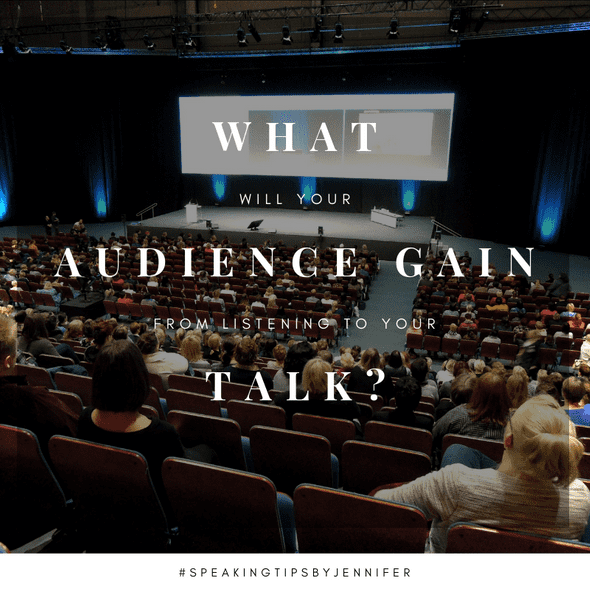
When you’ve taken a stab at writing, proof-reading, and re-writing your abstracts reach out to some peers for review. You can find other speakers you may know, people who attend conferences, local meetup organizers, or any conference organizers if you know them. Their fresh eyes may catch things you didn’t realize were unclear, or help you craft your tone. For about 8 months I’ve had an abstract for a talk in mind that I just couldn’t get to where I wanted it. Reaching out to have peers review and help me tweak it was exactly what I had been needing as I was too caught up in my own head.
Start small
Panels
If you’re brand new to public speaking, participating in panels can be a good way to ease into speaking. There’s a moderator and other participants, so the focus isn’t solely on you and you don’t have to prepare content in advance. You can reach out to event organizers in your discipline and let them know of your interest.
Toastmasters
If you’d like more pragmatic practice in public speaking, there are many toastmasters chapters around the world. Toastmasters is an organization aimed at helping people grow their communication and leadership skills - essentially a meetup to practice public speaking at!
K-12 Schools
Teachers are always looking for career speakers to come give a short talk in their classrooms. Nothing will get you over the fear of an audience like trying to talk about your job to a group of uninterested pre-teens. ;) Seriously though, talking to students about your jobs requires little preparation and is great public speaking practice - just bring a few talking points, and the school will be very grateful. Contact local tech ed groups to offer your services, they’ll be able to point you in the right direction for school speaking requests.
User Groups
When you have your abstracts written, reach out to some local meetup groups or code schools to see if they’re be interested in you giving your talk. Meetup organizers are always looking for speakers and content and will likely love to have you test out your talk on their attendees.
Find Conferences to Submit To
Now you have your abstracts written, get to submitting! LOL rhymes, I’m in an allergy haze, don’t judge me I’m trying to be helpful. Your odds will improve immensely if you submit more than one abstract to a conference, but make sure that the content your’re submitting is relevant to that conference. 3-4 abstracts are appropriate to submit, 10 abstracts from one speaker will ultimately annoy the crap out of the organizers.
Websites
There are a few popular websites for CFPs - the big one being papercall.io, you can create a profile + store all your talks, filter for open CFPs based on your tech area of interest, and set up email alerts for new CFPs. Papercall has a 300 character abstract limit which often infuriates me, so I typically submit a very short abstract there, and my full preferred abstract in the text box below as I usually need at least 40-140 more characters. While this site is great for finding CFPs - I’ve heard many complaints from conference organizers about it’s talk review capabilities and many have moved to Sessionize. Sessionize doesn’t list open CFPs, but it has profile and talk saving capabilities making it easy to submit your talks once you have the CFP link. I recommend creating a profile on both sites and listing/updating your talks on those for ease of submission.
Some generous individuals have compiled Twitter lists of conferences, and there are several accounts created just to tweet CFPs that are worth following.
Track Your Submissions
It’s a good idea to track your conference submissions not only to see your success, but to help manage your schedule, and have an idea of when to look out for CFPs the next year. My tracking spreadsheet has these columns:
| Conference | Date | Invitation | Acceptance | Keynote | Attendance | Location |
|---|---|---|---|---|---|---|
| JS Heroes | April 11th-12th | 0 | 0 | 0 | 0 | Cluj-Napoca, Romania |
| GETConf | April 26th | 0 | 1 | 1 | 1 | Omaha, NE |
| Longhorn PHP | May 2nd-4th | 1 | 1 | 0 | 1 | Austin, TX |
| KCDC | July 17th-19th | 0 | 1 | 0 | 1 | Kansas City, MO |
I track conferences in order of when they occur, and track which conferences invited me, which my talks are accepted to, which I actually am able to attend, and which conferences I keynote at.

Volunteer at Conferences
Many conferences depend on volunteers for setup, check-in, room-monitoring, etc. Not only will volunteering for conference score you a free ticket, you’ll have access to facetime with conference organizers and speakers - this can be a great opportunity for those new and trying to break into the scene.
Ask for Feedback
Some conferences will offer feedback on abstracts they didn’t accept - take every advantage of this offer to find out how to make your abstract resonate better. Not all conferences will be in a position to offer feedback, again, as many are run by volunteers taking time away from their personal lives to review talks. Some conferences have even begun to offer speaking mentors as a way to encourage new speakers and ensure high quality content.
Be Gracious
Speaking is a privilege, not a right. I see a lot of ego and entitlement in the speaking community, and I also see when it rubs conference organizers the wrong way. Conference organizers will remember how you handle rejection, especially if it’s poorly. Nothing will get you blacklisted faster than harassing committee members for daring to not select your talk. On the other hand, I’ve seen people handle rejection gracefully, and when a speaker backed out of a conference, said gracious individual was first in line to be asked to fill that spot.
On the note of graciousness and entitlement, I’d like to address the concept of “gender quotas” at the bottom of this article **
3. Stand Out From the Crowd
As I mentioned earlier, there will often be many abstracts submitted on a single topic, and from there it’s up to the committee to decide who can deliver the content best. If the committee can’t find out any information about you, your chances of being selected are slim.
Work on Your Web Presence
1. Make (or update) your damn website.
You’re a technical person, get a webpage displaying your existence up to prove you exist. ;)
Seriously though, get a personal website set up, and make sure it reflects your skill. I recently redid mine in Gatsby, which I’d highly recommend - they have themes so the design-challenged people won’t struggle too much. Have a page that lists your speaking experience - anything from panels to meetups to actual conference talks. Pay attention to SEO, accessibility, and meta tags while you’re at it. If you post your resume, make sure to leave off your phone number, especially if you’re a woman. #antistalkingtipsbyjennifer
2. Craft a good bio.
I get it, writing a bio sucks, and writing in the 3rd person is just weird. Take the time to really think through creating a good bio, reach out to have friends, peers, or coworkers review it. You’ll be happy you made the effort, and you can tweak it over time as your skills, interests, and achievements grow.
I’m a little bit of a jackass with mine - but it works for my bitchy, sometimes self-deprecating personality. And winning PubConf Sydney 2018 is still the highlight of my life and I will never shut up about it.
Jennifer Wadella has been writing code since before she realized it was a credible career path. She currently works as a JavaScript Consultant at Bitovi and loves building performant web applications, speaking at technical conferences, and brewing kombucha. Jennifer is an active member of the KC tech community and the founder of Kansas City Women in Technology (KCWiT), an organization aimed at growing the number of women in technology careers in Kansas City. She is the PubConf Sydney 2018 Champion, a Silicon Prairie Champion Award Nominee, Rising Trendsetter STEMMy award-winner, and is apparently Missouri’s Coolest Woman according to Pure Wow.
3. Get a good headshot.
Checkout networking events in your area - sometimes they’ll book photographers to do free headshots. Some conferences, like KCDC, have even started offering headshots by the conference photographer. At the very least find a friend with an iPhone 8 or Pixel 3 to snap a photo of you for now.
4. Start a blog.
A great way to test talk ideas is by writing a blog article on them first. Writing an article will help you outline your ideas, find an order that is coherent, and showcase your knowledge on the subject.
5. Push out some content
You blog is a great homebase for your ideas, but explore pushing articles or videos out to mainsteam places a technologist would look for information, like Youtube, Pluralsight, Egghead, etc.
6. Be on Twitter
Twitter seems to be THE conference communication tool - it’s a way to find CFPs, engage with other speakers and thought leaders, and stay current on technical topics. Just don’t be a douchecanoe, nothing ever really gets deleted from the internet.
Be a Speaker Conferences Want to Invite Back
Conference organizers spend a lot of time and energy trying to put together good events with fun networking and social opportunities.
Participate in the “Hallway Track”
Don’t be that speaker who holes up in the speaker lounge and only comes out for their talk. Spend some time in the hallways with attendees. Many attendees may have questions they didn’t have a chance to ask during your talk, or may have helpful feedback. They may also just be awesome new best friends you didn’t know you needed. This can be a lot harder for introverts, so take some time to recharge, then find a chill spot to hang out and be present, people will come to you, I promise. = )
Engage with the Community
Help promote the conference on social media, and encourage people to attend your session. Most conferences aren’t just a one-off event, they are built from communities with awesome people having conversations year round.
Attend the Events
Show up to the keynotes. I know it’s tempting to sleep in, and I’m definitely guilty of skipping on occasion, but most attendees will attend the keynote, and you can reference or connect to the keynote in your talk. At NDC Porto this year a bunch of the speakers went out to dinner before the conference, and had a delicious fish we named “Jerry”. We made a pact to work Jerry into our talks, and in his keynote Richard Campbell let the attendees in on our little joke and explained why Jerry would make an appearance in talks. (Spencer and Mat, ya’ll owe us drinks at KCDC for not including Jerry in your slides)

Also be sure to at least stop by the networking events and dinners for a little bit, get to know the attendees, other speakers, organizers, and the volunteers. Be present, be thoughtful, and get off your phone, Twitter and Slack notifications can wait. Also, if you don’t show up to the events you’ll miss out on groups going to awesome after parties, normally full of good food, good drinks, and great conversation.
Sometimes conference selections are a networking game - if the decision is down to you and another speaker, and the conference organizers know you, know you can deliver a good talk, and are a fun person to hang out with your chances of winning that selection go up immensely.
4. When Speaking
So you’ve made it in, you’re about to give your first talk. A few pro-tips to keep in mind.

Always be prepared. Bring your powercord, display adaptors (I carry 2 because damn HDMI cables be grumpy sometimes), bring a water bottle, and a clicker if that’s your jam -I have this one.
In my first few slides I like to thank the conference organizers, volunteers, and sponsors. Some conference will give you an actual sponsor slide of logos to include.
Conferences will sometimes have a way to review sessions. Ask the organizers about the process they use or if there are links or apps attendees need, and encourage your talk attendees to submit feedback. You’ll get valuable insight about how your content was received and how to improve, and many conference use these evaluations to determine which speakers they’ll invite back.
Finally, be prepared to share a link to your presentation, either on your last slide, or on twitter after your talk. This is a common request - I use revealJS and deploy my slides to github pages before the presentation and encourage my attendees to take a picture of the last slide with my link to the presentation.
Additional Resources
Here are a few links to speaker starting kits and articles on CFPs and abstracts I think are really good:
- Cory House - speaker starter kit
- That Conference - your abstract sucks
- Jono Bacon - get your cfp session picked
- Codemash - Call For Speakers
Conclusion
This concludes my guide to conference speaking like a boss. Go forth, submit some awesomeness, stay humble, and inspire the world!
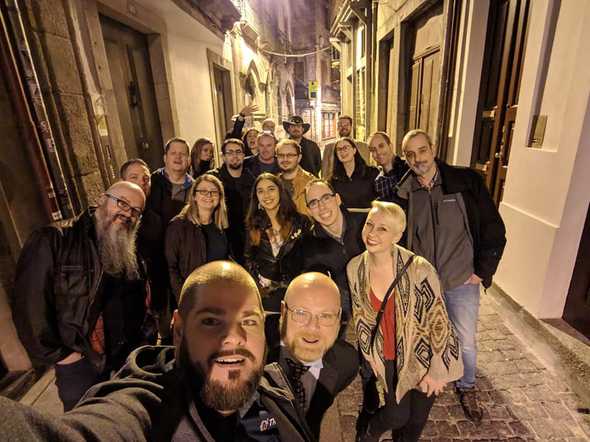
^ What happens when you go to the events and get to hang out with other awesome humans.
**… On “gender quotas” and speaker selection
Many people have noticed conference organizers making an active effort to diversify their speaker lineup as an effort to help make the tech industry and events more inclusive. I see a lot of backlash and upset at the idea of trying to have closer parity on women or non-binary speakers as it is “unfair”.
On women applying to anything:
A study by Hewlett-Packard showed that “Men apply for a job when they meet only 60% of the qualifications, but women apply only if they meet 100% of them.” This is demonstrated routinely, and anyone involved in the interview process or reviewing resumes can attest to this. Women are more concerned with potential failure, as society punishes us much more harshly for failing than men.
Applying to speak or voice your technical opinions is like drawing a large target for attack on your back, and for women the attacks will be far harsher and far more baseless than the attacks on men. Just take a look at the disparity of likes and comments on men’s talks vs. women’s talks posted on the NDC Youtube Channel.
This means women applying to speak are confident that they know their topic and can present it well, and are already thinking about and preparing to face an unsurmountable amount of harassment for daring to do so before they even submit an abstract.

They have also already reached out to their network of friends to find out which conferences not to apply to for fear of harassment, discrimination, lack of code of conduct, or other issues not handled well by organizers, ANDwhich male speakers to avoid being at the same conference with. FYI - us ladies talk, in twitter DMs, in Slack, over coffee, and we share stories of harassment or entitled men trying to take speaking spots from us even though we’ve earned them.
On women in the workplace:
Women are already at an extreme disadvantage in the workplace, with society doubting their technical abilities and not taking them seriously. Women know they have to work much harder than their average male counterparts to be taken seriously, it’s been shown in studies that men are promoted based on potential, while women are promoted solely based on performance. Women are also given poor feedback or given intangible improvement suggestions that limit their success. This means the small amount of women left in the technology workforce (and the even smaller pool of those women applying to speak at conference) tend to be the best at what they do, because mediocrity isn’t even an option and as a consequence have worked much harder to get any recognition or success they’ve received.
If you are of the opinion that gender parity is “unfair”, I’d like you to take some time to consider why you deem yourself to be better or more worthy than the female,non-binary, or POC speakers selected.


